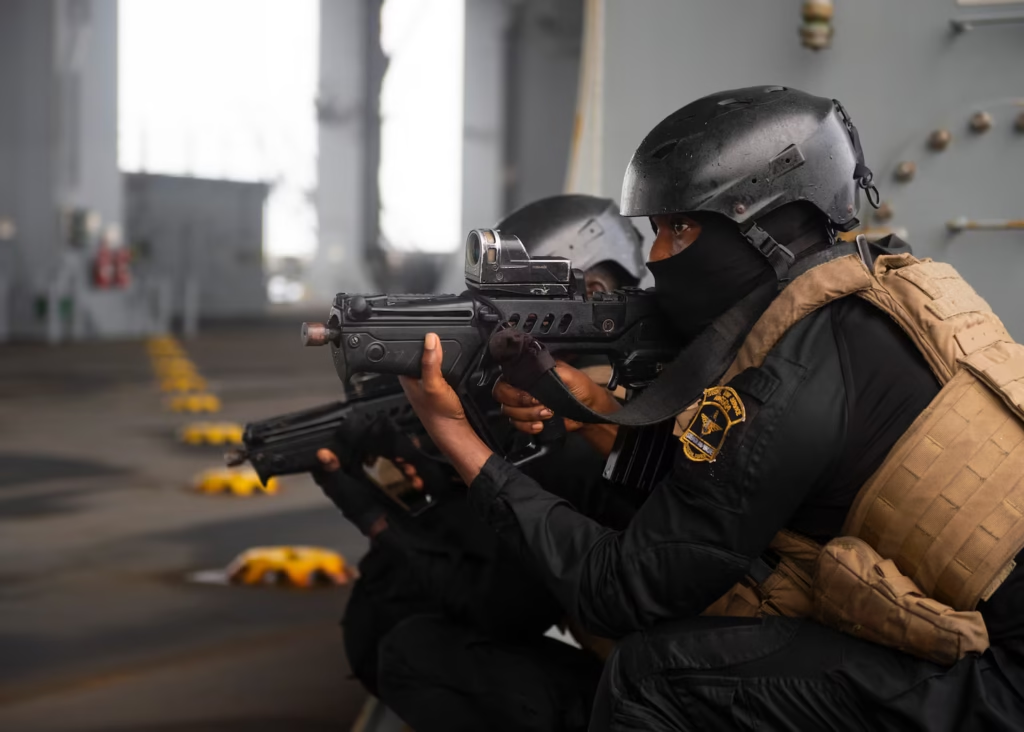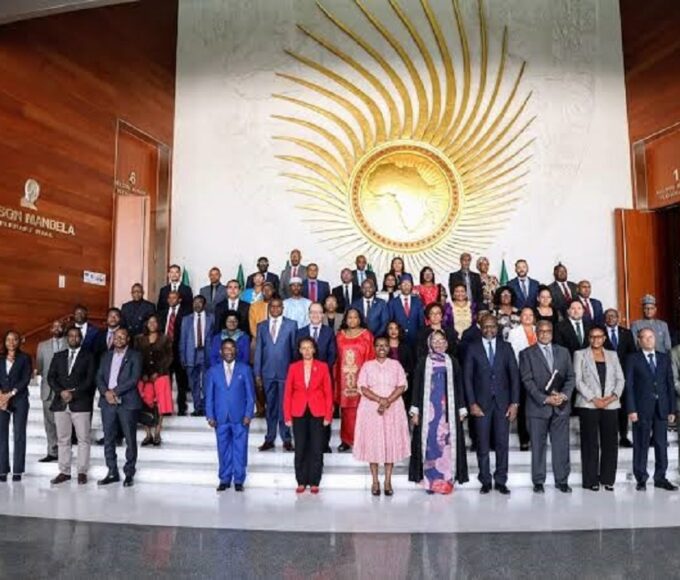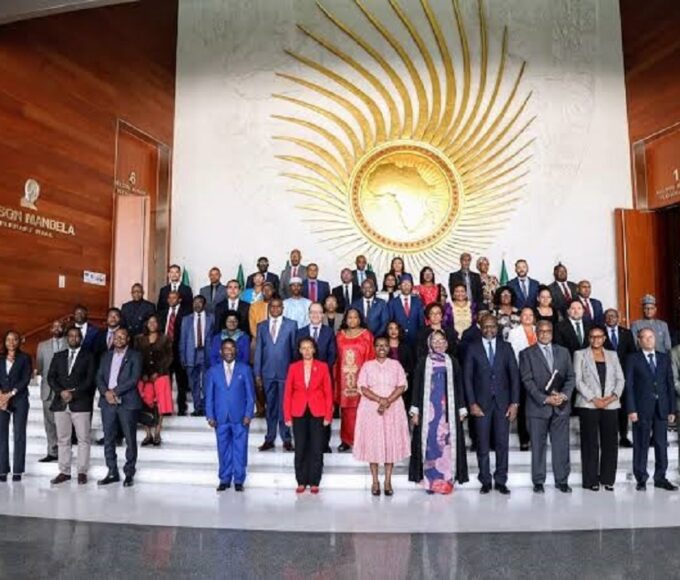
Maritime Terrorism and Coastal Security: Why the Gulf of Guinea Remains Critical
Despite some decline in piracy incidents—down approximately 90% in 2024 compared to 2020—the region remains a hotspot for maritime crime.
The Gulf of Guinea (GoG), stretching over 6,000 kilometres of coastline and comprising 19 nations, stands as a region of immense strategic, economic, and geopolitical significance. Rich in natural resources such as oil, gas, and minerals, and serving as a vital maritime corridor connecting Africa to the Americas and facilitating regional trade through initiatives like the African Continental Free Trade Area (AfCFTA), the Gulf of Guinea is undeniably a linchpin in global maritime security. However, its strategic importance is shadowed by multifaceted maritime threats, including piracy, illegal fishing, drug trafficking, and the looming spectre of maritime terrorism. These threats stretch law enforcement and military capabilities, creating a permissive environment for illicit activities that jeopardise regional stability, economic development, and international security.
Strategic Importance of the Gulf of Guinea
The Gulf of Guinea’s geographical location makes it a critical nexus for international trade and resource extraction. It serves as a gateway for commodities flowing from Africa to global markets, particularly through key ports in Nigeria, Ghana, Cameroon, and Togo. The region holds significant reserves of oil (accounting for approximately 4.5% of global reserves) and natural gas (around 2.7%), alongside valuable minerals including diamonds, tin, bauxite, manganese, and cobalt. Its waters are also vital for fisheries, contributing about 4% to global fish production.
This strategic positioning increases its appeal not only for legitimate commerce but also for illicit activities. Its extensive and often poorly monitored coastline provides avenues for criminal groups to operate with relative impunity, fueling a cycle of insecurity and economic disruption.

Maritime Insecurity: Piracy and Illegal Activities
Despite some decline in piracy incidents—down approximately 90% in 2024 compared to 2020—the region remains a hotspot for maritime crime. Nigerian pirates, for instance, kidnapped nearly 1,000 seafarers over the past decade, with notable attacks such as the January 2024 hijacking of the Hana 1 chemical tanker near Equatorial Guinea. These attacks often involve hijackings, kidnapping for ransom, and the siphoning of oil cargoes, reflecting a black-market economy deep-rooted in corruption and weak governance.
Piracy in the Gulf of Guinea has evolved through several phases. Initially opportunistic thefts in the 1980s, it transitioned into a terrorist dimension in the 2000s with the rise of militant groups demanding autonomy and control over oil resources. Post-2009 amnesty programs saw piracy shift towards financially motivated hijackings, primarily targeting oil tankers and siphoning their cargo. Since 2016, pirates have increasingly engaged in kidnapping crew members for ransom, a tactic that requires less sophistication and investment but yields immediate financial gains.
The region’s law enforcement agencies, despite investments like Nigeria’s $195 million “Deep Blue” project and regional information-sharing initiatives such as the Yaoundé Architecture, struggle with resource constraints, corruption, and jurisdictional challenges. Foreign navies from Europe, the US, India, Brazil, and others have deployed assets to combat piracy; however, issues surrounding sovereignty, legal frameworks, and operational coordination persist. An illustrative case is Denmark’s engagement off Nigeria’s coast in 2021, which resulted in casualties and legal ambiguities regarding the prosecution of pirates.
Beyond piracy, illicit activities such as illegal, unreported, and unregulated (IUU) fishing, drug trafficking, and human smuggling further undermine maritime security. Foreign fishing fleets, particularly Chinese and European vessels, often operate in violation of national regulations, depleting fish stocks, damaging marine ecosystems, and fueling coastal community grievances. These activities weaken the rule of law, perpetuate corruption, and provide cover for other illegal enterprises.
The Threat of Maritime Terrorism
While direct terrorist attacks on merchant vessels and port facilities are relatively limited, the potential for maritime terrorism remains a significant concern. The proximity of terrorist groups operating in the Sahel and inland regions of West Africa—including Boko Haram, Al-Qaeda in the Maghreb, and ISIS affiliates—poses a latent threat to maritime security. These groups could exploit maritime vulnerabilities to conduct attacks, smuggle weapons, or facilitate cross-border insurgencies.
The December 2023 hijacking of the MV Ruen off Somalia drew international attention to the persistent threat of maritime terrorism. Although the Gulf of Guinea has yet to experience a large-scale terrorist attack comparable to those in the Gulf of Aden, the region’s complex security environment, combined with weak governance and economic disparities, makes it susceptible to future threats.
Economic and Social Impacts
Maritime insecurity has profound economic consequences. Disruptions to shipping routes, increased insurance costs, and the destruction of fishing livelihoods undermine regional development. Oil theft and illegal refining, especially in Nigeria’s Niger Delta, have caused environmental degradation, social unrest, and impoverishment, fueling grievances that can be exploited by criminal and terrorist groups.
Furthermore, the social fabric of coastal communities is strained by pollution, environmental disasters, and lack of economic opportunities, fostering grievances that can escalate into violence or support for radical groups. Addressing these root causes through economic diversification, environmental remediation, and inclusive governance is essential for sustainable security.
Global Implications and Geopolitical Dynamics
The Gulf of Guinea’s security challenges extend beyond regional borders, impacting global trade, energy markets, and international security. Disruptions in this vital maritime corridor threaten to escalate tensions among global powers vying for influence in Africa. China’s expanding port investments and alleged plans for naval bases, along with Western efforts to bolster regional naval capabilities, reflect a broader geopolitical contest.
The recent increase in joint military exercises—such as the U.S. Africa Command’s Obangame Express—and regional initiatives like the AU’s proposed Combined Maritime Task Force (CMTF) aim to enhance collective security. However, disparities in capacity, legal frameworks, and political will continue to hamper comprehensive security.
Strategic Responses and Future Scenarios
A multi-layered approach is essential to secure the Gulf of Guinea. This includes strengthening regional institutions like the Yaoundé Architecture, establishing rapid-response maritime task forces, enhancing legal frameworks for prosecution of pirates and terrorists, and fostering community engagement.
Potential future scenarios range from continued incremental improvements—characterised by regional cooperation and international support—to escalating insecurity if governance and economic challenges worsen. Conversely, a positive trajectory could see increased maritime domain awareness, self-reliant regional navies, and sustainable economic development.
Conclusion
The Gulf of Guinea remains a region of critical importance, balancing vast economic potential against significant maritime threats. Its security landscape is complex, requiring coordinated efforts across national, regional, and international levels. Addressing piracy, illegal fishing, and maritime terrorism is vital not only for regional stability but also for safeguarding global trade and energy supplies. The evolving strategic environment underscores the urgency for sustained investment, institutional strengthening, and inclusive development to ensure that the Gulf of Guinea remains a secure and prosperous maritime hub.

Recent Posts
Categories
- Air & Aerospace17
- Border Security15
- Civil Security6
- Civil Wars4
- Crisis5
- Cyber Security8
- Defense24
- Diplomacy19
- Entrepreneurship1
- Events5
- Global Security Watch6
- Industry8
- Land & Army9
- Leadership & Training5
- Military Aviation7
- Military History27
- Military Speeches1
- More1
- Naval & Maritime9
- Policies1
- Resources2
- Security12
- Special Forces2
- Systems And Technology9
- Tech6
- Uncategorized6
- UNSC1
- Veterans7
- Women in Defence9
Related Articles
RUSSIA’S WAGNER LEGACY IN AFRICA POST-PRIGOZHIN
In the diamond fields of the Central African Republic, Yevgeny Prigozhin’s shadow...
ByKing Richard Igimoh, Group Editor ALOOctober 1, 2025AFRICAN UNION SECURITY SUMMIT CONCLUDES WITH BOLD PLEDGES ON PEACE, REFORM, AND GLOBAL EQUITY
The 38th Ordinary Session of the African Union (AU) Assembly in Addis...
ByKing Richard Igimoh, Group Editor ALOSeptember 29, 2025AFRICAN UNION SECURITY SUMMIT CONCLUDES WITH BOLD PLEDGES ON PEACE, REFORM, AND GLOBAL EQUITY
The 38th Ordinary Session of the African Union (AU) Assembly in Addis...
ByKing Richard Igimoh, Group Editor ALOSeptember 26, 2025General Musa Leads Civil-Military Reset in Nigeria
Under General Musa’s Watch, Nigeria’s Military Reimagines Civil-Military Relations at Landmark...
ByKing Richard Igimoh, Group Editor ALOJune 23, 2025













